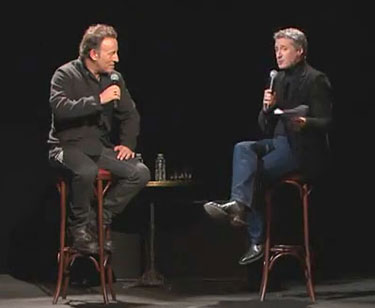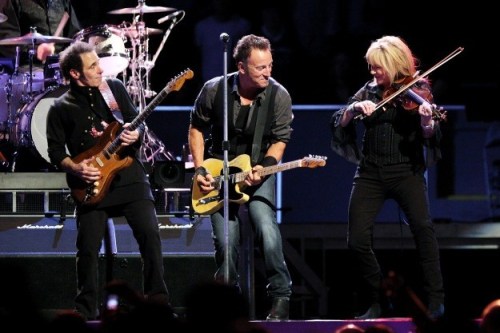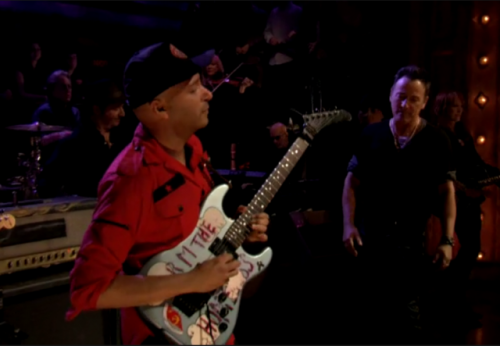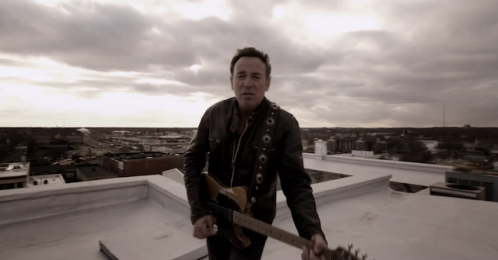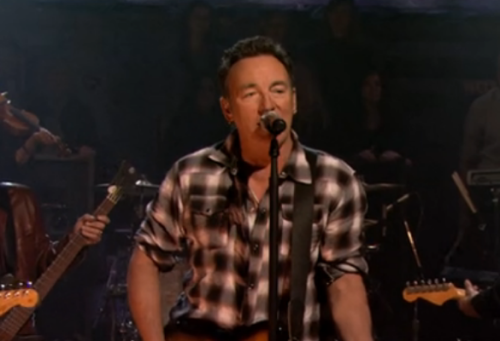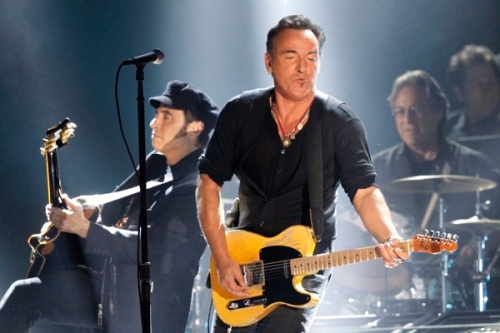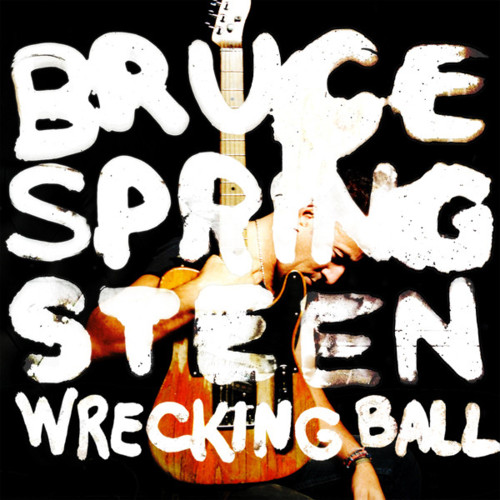
At a top-secret Paris press conference last month, Bruce Springsteen talked about his brand new album, “Wrecking Ball,” how it grew out of a gospel album he had been working on for about a year and his own perceived job as a rock and roll singer/songwriter and troubadour of the road. “You can never go wrong pissed off in rock and roll,” Springsteen told his interviewer and a crowd of several hundred onlookers. “The genesis of the record was after 2008, when we had a huge financial crisis in the States and there was really no accountability for years and years. There was no movement, there was no voice that was saying just how outrageous – that a basic theft that struck at the heart of the entire American idea was about. It was a complete disregard of history, of context, of community,” said Springsteen. “It was just an enormous fault line that cracked the American system wide open.”
The New Jersey native and Rock and Roll icon was mad as hell and wasn’t going to take it anymore, so he began several years ago writing the songs that comprise his new album, “Wrecking Ball.” The result is a multi-layered, big, mulligans stew of an album, full of diverse sounds and loops, as well as a rocking gospel-singin’ counter attack by Springsteen and friends. And it was all aimed at the “fat cats,” the “gamblin’ men” rolling the dice up on “banker’s hill” where “the party’s going strong,” and the rest of the corrupt, corporate thieves and “robber barons” whom Springsteen asserts have brought this country to the lowdown, divisive place where we stand today.
The record opens with the anthemic and heavily hook-laden “We Take Care Of Our Own,” a song that can be interpreted in several ways, such as “We don’t take care of our own” and “We take care of some of our own,” etc. There’s a strange guitar sound at the start of the opening cut and it’s the sound of an alarm; the sound of an emergency that needs to be addressed. On the two songs that follow “Easy Money” (about a guy planning a heist…just like a corporate crime) and on “Shackled and Drawn”, Springsteen plays the role of the common man “trudging through the dark in a world gone wrong.” Both songs musically match the mood of the Seeger Sessions, from several years ago, with plenty of banjo and fiddle.
Perhaps the most beautiful song of the album, “Jack Of All Trades,” is a simple ballad by Springsteen in which an out of work man reassures his partner that he will always be able to provide. The beauty is in the songs naked, unembarrassed honesty, as well as in a gorgeous horn part and a scorching guitar solo played by guest guitar slinger Tom Morello (of Rage Against The Machine and The Nightwatchman). This song is, quite simply, one of Springsteen’s most tender ballads.
But Springsteen’s most vile venom is reserved for “Death To My Hometown” a Gaelic-foot stomper, which could have been written and performed by both The Pogues and The Dropkick Murphies. Springsteen uses plenty of Irish soul and a few penny whistles to back up his urgent delivery on this scorcher:
Oh, no cannonballs did fly, no rifles cut us down
No bombs fell from the sky, no blood soaked the ground
No powder flash blinded the eye, no deathly thunder sound
But just as sure as the hand of God, they brought death to my hometown
They brought death to my hometown, boys
This is probably as pissed-off as Springsteen has ever been, recounting a kind of midnight raid by nameless “marauders” in darkened board rooms that left many Americans jobless, homeless and shaking their heads in disbelief. But this is also a cautionary tale warning of these same thieves returning: “the greedy thieves who came around and ate the flesh of everything they found” and “who’s crimes have gone unpunished now” and “walk the streets as free men now.” Incredibly, some critics have already pounced on the album, damning it for failing to live up to the anger that it was said to contain. It seems hard, actually, to imagine any album more angry that this. If your blood isn’t boiling after hearing this song you may not have a pulse.
“Death To My Hometown” is important in one other way. It marks an end to Springsteen’s radical ire, and he comes up for air and a bit of levity with the title cut to “Wrecking Ball,” a song that was written while on tour in tribute to the soon-to-be demolished Giants Stadium. Springsteen has said that in addition to working on that level, “Wrecking Ball” also serves as a metaphor for the dismantling of the American Dream. With “Wrecking Ball” comes a shift in this album’s focus, away from what has been, to an acceptance and understanding of the cyclical nature of things, and that “good times come and good times go…just to come again. So bring on your Wrecking Ball”
It’s a crucial turnabout by Springsteen and it heralds a new feeling (or what used to be called “Side Two”) and a love song, of all things, in “You Got It.” On this ditty, it’s just the singer and his guitar and it reminiscent one of some of his best love songs, like “Fire” and “I’m Goin’ Down.” This change of mood clears the way for what will probably be the least=liked track by Springsteen fans, the gospel, churchy “Rocky Ground.” On this track, Springsteen gets some help from gospel singer Michelle Moore who shines brightly. Beginning with the sample of Springsteen’s voice exclaiming, “I’m a soldier,” we hear Moore’s mellow refrain and a gorgeous appeal by Springsteen to “Rise up Shepard, rise up.” This song is easily interpreted as a call for everyman and woman to rise above the chaos and gloom. Rocky Ground is a song about survival and a heavenly, clarion appeal for acceptance and, eventually redemption, by Springsteen. In addition it includes Moore singing a bit of rap, a first for any Springsteen song. But it works nicely and “Rocky Ground” is soulful and smooth as silk. Combined with the totally reworked and soul-infused studio take of “Land of Hope and Dreams” and the gorgeous album-ending “We’re Alive,” the album’s last three songs promise better times to come, and actually mimic the same arc from despair to hope that has been so central to Springsteen’s past albums and live shows.
Springsteen chose to work with a new man at the controls, Producer Ron Aniello, and he brings a great deal with him on “Wrecking Ball.” It’s a winning combination and it’s tantalizing to consider what these two can accomplish together next time out. But taken as a whole, “Wrecking Ball” may be the first Springsteen album since “The River” to travel as much emotional terrain as one of his legendary shows, and it will be interesting to see how much of the album Springsteen will include in concert when his world tour kicks off at the Apollo Theater in New York City this Friday night.
“Wrecking Ball” is, after all is said and done, a topical and ferocious new Bruce Springsteen album. It contains the voices of so many different souls, all inhabited by a mature and enlightened songwriter, as he continues to, in his own words, “chart the distance between American reality and the elusive American Dream.” It is an album that will not only stand the test of time, but reveals right now just how talented and astute Bruce Springsteen is in measuring the miles that we all travel together.

